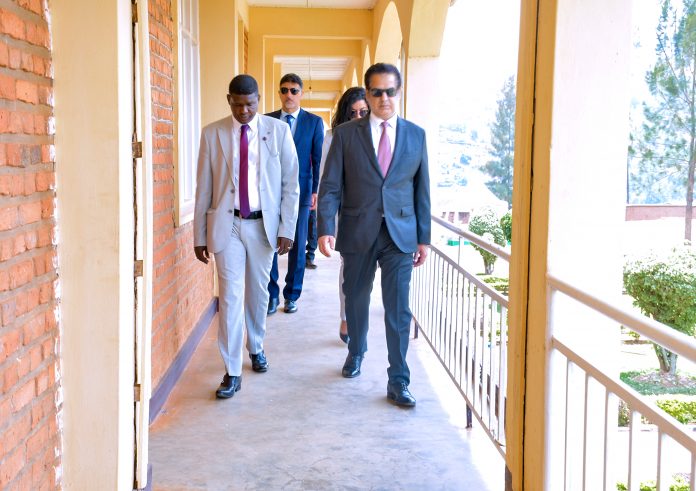
November , 28 , 2022
Dr. Ali Rashid Al Nuaimi, Head of the Parliamentary Division of the Federal National Council, accompanied by Hazza Al Qahtani, the UAE Ambassador to Rwanda, conducted an inspection visit to Sheikh Hamdan bin Rashid Al Maktoum School in Rwanda during an official visit to the country. He inspected the progress of work at the schools run by Al Maktoum Foundation. His Excellency pointed out that the late Sheikh Hamdan bin Rashid Al Maktoum, may his soul rest in peace, devoted considerable attention to providing education in poor places in several countries, especially in Africa. He stressed that the educational project of Sheikh Hamdan bin Rashid Al Maktoum in Africa, according to the African Union, is the most important charitable educational project on the continent funded, implemented, and managed by only one institution – the Al Maktoum Foundation.
The Foundation had organized a scientific training course under the patronage of Her Highness Sheikha Hissa bint Hamdan bin Rashid Al Maktoum to train on “iPad” at the Foundation’s schools in Muhanga in Kigali, the capital of Rwanda, with the participation of students of the Higher Colleges of Technology in Dubai, as a part of the scientific and cultural program for the exchange of experiences adopted by the Foundation in its educational institutions in Africa and Europe.
This training course is an important addition in the way of achieving the objectives, gaining and sharing experience between Emirati students and the students of Sheikh Hamdan bin Rashid schools. The program benefited thousands of students who needed modern and efficient educational institutions.
For his part, Hazza Al Qahtani, the UAE Ambassador to Rwanda, who gave a lecture to students entitled “Education in the UAE,” said that Sheikh Hamdan’s educational program in Africa aims to provide its distinguished services to countries that have suffered from the scourge of wars and conflicts in that region, Rwanda included. He stressed that the Foundation has done its utmost to continue the implementation and development of this vital project.
In Rwanda, the Foundation built two schools (Gitarama and Kumsanji). In 2002 Gitarama high school was opened for girls (50 km from the capital Kigali), which is considered an integrated school with its spacious buildings, yards, laboratories, furniture, efficient management, and distinguished teachers. It was the best charitable project offered by the Arabs to an African society plagued by war and massacres. The school expanded to more than 600 students, 70% of its female students were among those who lost their families in the massacres that killed one million persons, the school is still visited by Rwandan leaders and guests from abroad to be briefed about its experience and efficiency. In 2005, the Foundation launched a project for building another high school in the capital Kigali, the Kumsanji school, which was built on a high green hill in the center of the capital, and was elegantly constructed, equipped with science and computer labs and sports fields for more than 300 students.
A report prepared earlier by the Foundation, regarding the educational projects that the late Sheikh Hamdan bin Rashid Al Maktoum directed to be carried out in poor areas, shows that in 2005, the first batch of students in the Sheikh Hamdan schools in Africa graduated from universities. Since then, more than 20 African countries continue to receive new students from these schools each year in different fields.
The report states that the schools are covering many African countries, including Somalia, where there are two high schools were established in Hargeisa and Bosaso, north and east Somalia. The school in Hargeisa can accommodate more than 800 students and is considered the best school in Somalia to this day. It has graduated 1934 students thus far, 31 percent of which are females. 68 percent of those graduates were able to attend universities and higher institutes.
The school in Bosaso, also accommodates around 380 students, 35 percent of which are females. Many students who went to that school have graduated from Sudanese and Somali universities, as well as other universities in East Africa, Egypt, Malaysia and others.
In Comoros, a school was established in 2002 in Moroni, the capital of Comoros, and it has the capacity to accommodate around 240 students. It is considered one of the best scientific high schools in general, and one of the best schools on the island in terms of educational equipment and academic results, as it has ranked first among all other state schools in the university enrollment examinations.
In Sudan, Al Maktoum Foundation opened three integrated educational and service complexes in both Baba Village, south Darfur, and Aru Village in central Darfur. There are four high schools affiliated with Al Maktoum Foundation located in the poor neighborhoods of the capital (Ambada, Karary, Al Nasr, and Jebel Aulia schools). The Foundation has two schools in South Sudan, located in Juba and Malakal. Both schools started operating in 1998 and played a vital role in providing education to the people of South Sudan, especially during the civil war. A number of university graduates studied in these schools and began to work in important and prestigious positions in the State of South Sudan and the Republic of Sudan.
Two other schools are in Kenya. The first is a school in Nairobi, which is a primary school established in 1998. The second is a high school for females in Cagado that was established and opened in 2003. Cagado school accommodates 169 students and ensures providing high quality education with the appropriate teaching environment, which helped maintain a distinguished educational performance. The high school also features some student associations and clubs, such as wildlife, media and computer, and the Muslim community clubs, in addition to arts and drama association, among others.
Sheikh Hamdan bin Rashid Secondary School for Females was opened in the city of Mbale, Uganda in 1998, with a fully equipped lab, a masjid, water well and a residence for the students. Rated as one of the best schools in the country, the school also hosts students from neighboring countries such as Somalia, Kenya, Rwanda, Tanzania and Burundi. It currently accommodates 692 students, and it has a section specialized in memorizing the Holy Quran.
130 of the students who graduated from universities are already working in the fields of medicine, media, education, police, law, pharmaceuticals and banking, in addition to other 153 students who graduated from this school and are currently attending various universities.
In 1998, Hamdan bin Rashid School was opened in Zanzibar, and is currently accommodating 391 students. Up until recently, more than 530 students have graduated from this school.
The school was established as a developmental paradigm to support the educational process for the community that suffers from extreme poverty in the region. This project was widely welcomed by both the population and the educational authorities in the area. The Foundation has also established the Al Maktoum Engineering College in Dar es Salaam, which is a technical education college that grants diplomas in IT, Electricity and Electronics. The college celebrated its first graduates last year after completing their studies in IT. Moreover, the Foundation has established Sheikh Hamdan Complex in Zanzibar, which consists of a masjid and Quran education school. Two additional masjids were also opened in Aconcagua and Mtwara in Tanzanian desert.







